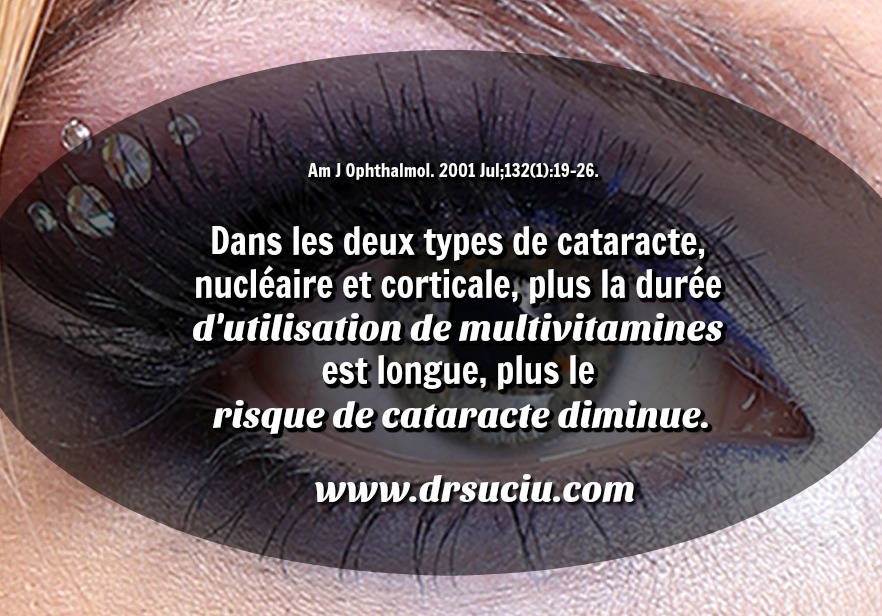|
Dans les deux types de CATARACTES, nucléaire et corticale, plus la durée d'utilisation de multivitamines est longue, plus le risque de cataracte diminue. Veuillez lire l'article complet (en anglais seulement) : Abstract PURPOSE: To investigate relationships between use of vitamin supplements and the three principal cataract types in a population-based sample. METHODS: We studied 2873 of the 3654 participants (79%) aged 49 to 97 years attending the cross-sectional Blue Mountains Eye Study who completed a detailed food frequency questionnaire, which included type, dose, and duration of vitamin supplement use. Masked grading of nuclear, cortical, and posterior subcapsular opacities from lens photographs was performed, using the Wisconsin method. RESULTS: Use of multivitamin supplements was associated with reduced prevalence of nuclear cataract, odds ratio 0.6, 95% confidence interval 0.4 to 1.0, P =.05. For both nuclear and cortical cataract, longer duration of multivitamin use was associated with reduced cataract prevalence (nuclear cataract, trend P =.02; cortical cataract, trend P =.03). Use of thiamin supplements was associated with reduced prevalence of nuclear (odds ratio 0.6, confidence interval 0.4 to 1.0, P =.03, dose trend P =.03) and cortical cataract (odds ratio 0.7, confidence interval 0.5 to 0.9, P =.01, dose trend P =.02). Riboflavin (odds ratio 0.8, confidence interval 0.6 to 1.0, P =.05) and niacin (odds ratio 0.7, confidence interval 0.6 to 1.0, P =.04) supplements exerted a weaker protective influence on cortical cataract. Vitamin A supplements were protective against nuclear cataract (odds ratio 0.4, confidence interval 0.2 to 0.8, P =.01, dose trend P =.01). Folate (odds ratio 0.4, confidence interval 0.2 to 0.9, P =.03) appeared protective for nuclear cataract, whereas both folate (odds ratio 0.6, confidence interval 0.3 to 0.9, P =.01, dose trend P =.04) and vitamin B12 supplements (odds ratio 0.7, confidence interval 0.5 to 1.0, P =.03, dose trend P =.02) were strongly protective against cortical cataract. CONCLUSIONS:
Long-term use of multivitamins, B group and vitamin A supplements was associated with reduced prevalence of either nuclear or cortical cataract. A strong protective influence on cortical cataract, from use of folate or vitamin B12 supplements, is a new finding. RÉFÉRENCE: http://www.ncbi.nlm.nih.gov/pubmed/11438049 Am J Ophthalmol. 2001 Jul;132(1):19-26. Use of vitamin supplements and cataract: the Blue Mountains Eye Study. Kuzniarz M1, Mitchell P, Cumming RG, Flood VM. Les commentaires sont fermés.
|
AVIS IMPORTANT:
Veuillez prendre connaissance de cet avertissement et rappelez-vous que le site www.drsuciu.com ne saurait remplacer une consultation avec vos professionnels de la santé. L'information fournie sur le site web www.drsuciu.com est d'ordre général. Avant de prendre toute décision de nature médicale ou si vous avez des questions concernant votre état de santé personnel, adressez-vous à un professionnel de la santé qualifiée. D'aucune manière ces points de vue, commentaires et renseignements ne constituent une recommandation de traitement (préventif ou curatif), une ordonnance ou un diagnostic, ni ne doivent être considérés comme tels. Archives
Août 2017
|




 Flux RSS
Flux RSS